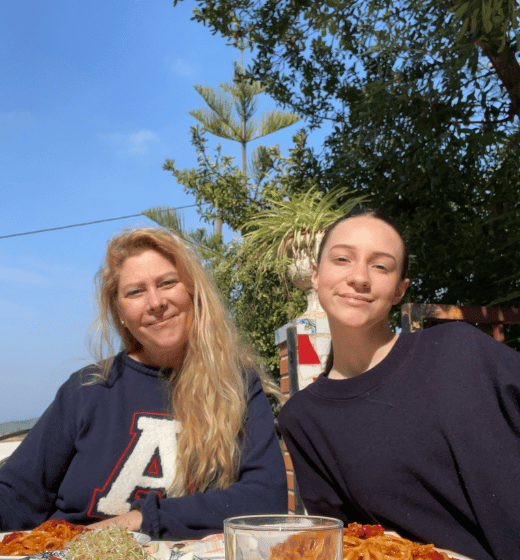

Valencia, a stunning city on Spain’s eastern coast, is a blend of timeless tradition and fresh modern energy, making it an ideal destination for young learners aiming to improve their language skills. Known for its vibrant culture, Mediterranean charm, and architectural beauty, it offers more than just a pretty backdrop for studying.
Please note that this program is not designed for complete beginners; some prior knowledge of Spanish is recommended before enrolling.
For students preparing for the Spanish IGCSE, Valencia becomes a living classroom. The rich history, daily conversation with native speakers, and opportunities for real-world interaction help turn revision into genuine understanding. The experience is designed to help students reach the proficiency required at GCSE level. It’s not just about learning the grammar rules—it’s about using them with confidence in a Spanish-speaking country.
From the peaceful hills of Gilet to the bustling heart of the city, this region offers a calm yet stimulating setting for academic growth. For learners like Sophie, it’s the perfect place to connect study goals with real-life experience and to turn exam preparation into something memorable.
Student Introduction
Sophie is a bright and energetic 15-year-old student from the UK who arrived in Gilet (a peaceful town near Valencia) with one clear goal: to strengthen her confidence in the Spanish language as she prepared for her IGCSE Spanish exams. Spanish was the subject Sophie chose to focus on for her IGCSE, making it a central part of her academic journey.
With her usual sense of curiosity and determination, Sophie saw this SHIP experience as more than just revision—it was a chance to live the language, hear it in real life, and make it part of her everyday thinking. While most learners rely solely on course materials and past papers, Sophie wanted more than worksheets and assignments. She wanted to prepare for her exams by truly understanding the rhythm, culture, and feeling behind each Spanish word.
Outside of her studies, Sophie is a competitive gymnast and even helps younger students train at her school. That same focus and energy carried into her language learning, where she balanced practical goals with a real love for improvement. Her family traveled with her for support, but she lived with me, a setup that gave her daily immersion and one-to-one time to grow both her communication skills and her trust in her Spanish voice.
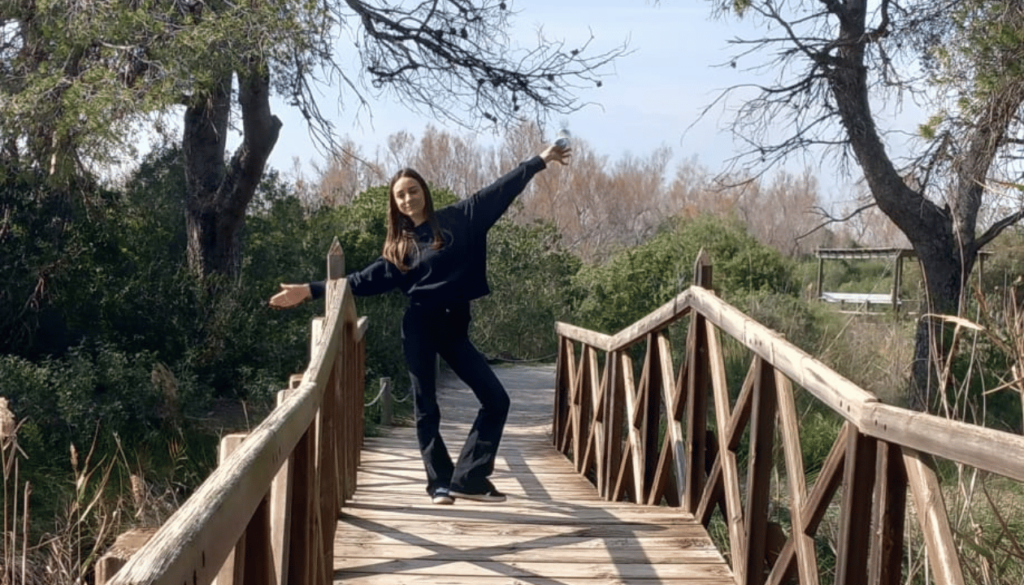
Introduction to Spanish IGCSE
The Spanish IGCSE is a widely recognised qualification designed to help students develop strong communication skills in the Spanish language. Whether you’re a complete beginner or have some experience, this course is tailored to prepare students for real-world conversations, academic success, and future opportunities in Spanish-speaking countries. For learners like Sophie, the IGCSE Spanish exam is more than just a test—it’s a stepping stone toward mastering another language and understanding a new culture.
Studying for the Spanish IGCSE opens doors to further education, travel, and even university courses, as it demonstrates your ability to learn and use a foreign language with confidence. The syllabus covers a range of topics relevant to everyday life, from school and family to hobbies and travel, ensuring that students build a solid foundation in Spanish grammar, vocabulary, and pronunciation. With the right support, resources, and a clear study plan, students can achieve a final grade that reflects their hard work and passion for languages.
Introduction to Valencia (Gilet)
Tucked away in the peaceful hills outside Valencia lies Gilet, a charming village surrounded by pine-covered mountains and clear Mediterranean skies. It’s a place where everything moves at a gentler pace, a quiet retreat perfect for students looking to focus, reflect, and grow.

Valencia itself is one of Spain’s most culturally rich and vibrant regions. A Spanish-speaking country known for its stunning coastline, ancient buildings, and friendly locals, it’s a destination that blends traditional life with modern comfort. And for someone preparing for the IGCSE Spanish exam, it offers more than sightseeing; it becomes a real-world setting for listening, speaking, and learning.
From street cafés to local markets, every part of Valencia encourages learners to apply their Spanish in context. Gilet adds the calm needed for focus, while Valencia offers the culture and conversation that bring classroom lessons to life.
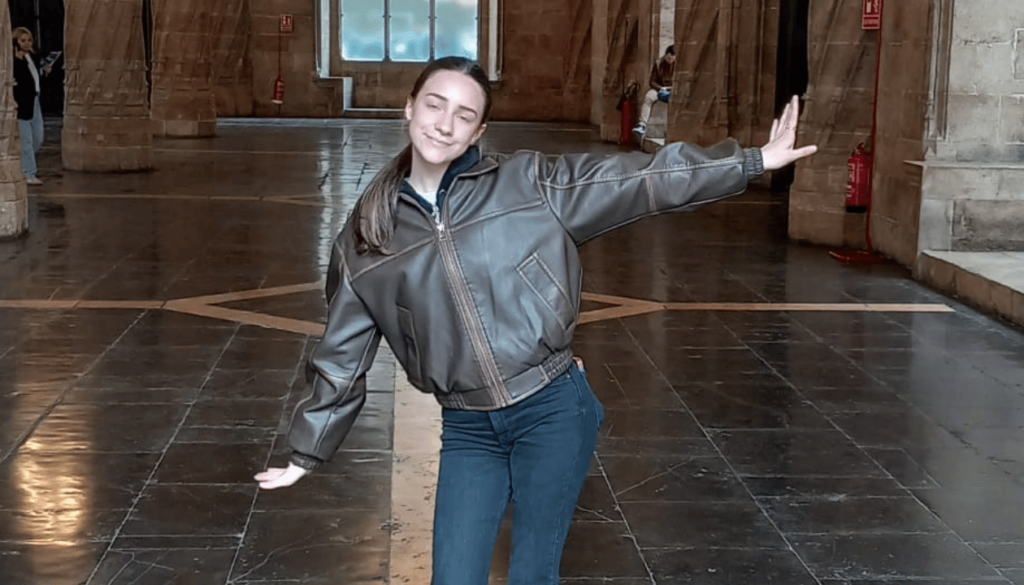
Planning the Trip
Sophie’s SHIP experience wasn’t something she did on her own. Her father and younger brother came along too, offering quiet support throughout the week. While they settled into a city apartment in Valencia, Sophie stayed with me in Gilet, where her focus was completely on preparing for her Spanish IGCSE exams.
This setup worked well. Sophie had her own space to concentrate on revision, but she also knew her family was close by. That balance gave her time to grow, both in her studies and in her confidence using the foreign language she had been learning at school.
She followed a clear study plan built around the IGCSE syllabus, which helped her stay organised. And by combining her usual online resources with daily practice in a Spanish-speaking home, she found new ways to improve her grammar and build her communication skills. As part of her IGCSE preparation, it was important to plan ahead and book exams at authorized centers to ensure a smooth assessment process. It was a week that helped her think more clearly about her future plans, not just her next exam.
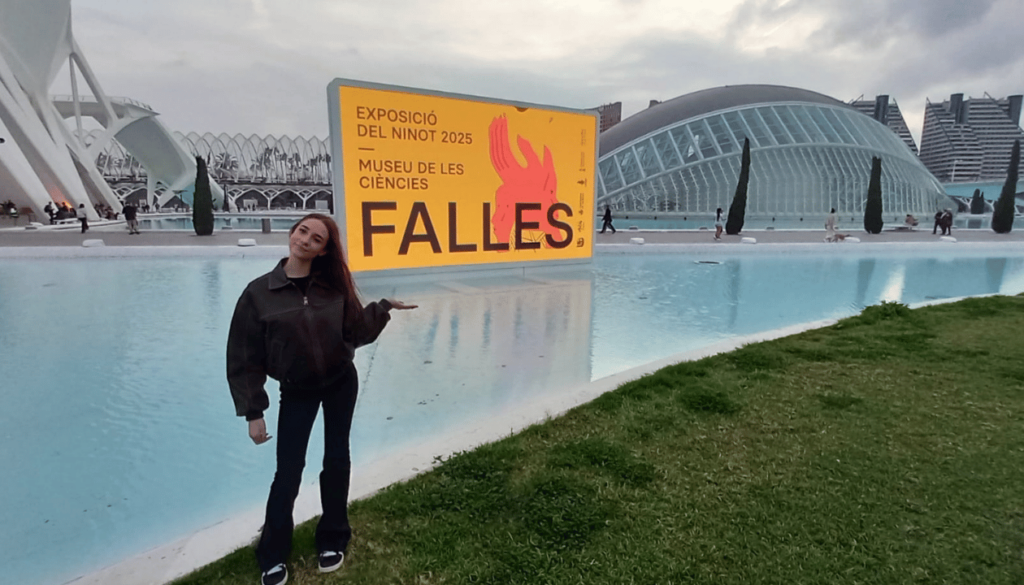
Understanding the Exam Format
The Spanish IGCSE exam is structured to assess a wide range of Spanish skills, ensuring that students are well-rounded in their understanding and use of the language. The exam board typically divides the assessment into several key components: the oral exam, listening exam, reading comprehension, and written papers. Each section is designed to test specific abilities, from speaking fluently and accurately to understanding spoken Spanish and writing clear, well-structured texts.
During the oral exam, students are asked to respond to questions, discuss specific topics, and demonstrate their pronunciation and communication skills. The listening exam challenges students to understand native speakers in various contexts, while the written papers focus on grammar rules, vocabulary, and the ability to express ideas in writing. Reading tasks require students to interpret texts and answer questions, building their comprehension and analytical skills.
To prepare for these exams, students often use past papers, tutor-marked assignments, and a variety of course materials. Tutor support is invaluable for providing guidance, feedback, and practice opportunities tailored to each student’s needs. Understanding the exam format early on helps learners like Sophie feel more confident and focused as they work toward their final grade.
Live the Language: Spanish IGCSE Lessons with Purpose
Each morning in Gilet, Sophie and I sat down together to focus on the areas she needed to strengthen before her IGCSE Spanish exam. I created a week-long plan around the official syllabus, making sure we covered topics like school life, holidays, identity, and family—all in Spanish.
We didn’t just go through exercises. Our lessons mixed real conversations with structured work. Sophie completed tutor-marked assignments, answered mock oral exam questions, and practised her writing with short texts based on the exam themes. I emphasized the importance of giving thoughtful, well-structured answers to demonstrate language proficiency. We took time with the grammar rules, making sure she understood them clearly and could use them with confidence.
It was lovely to see her build her Spanish skills day by day. I gave her space to speak freely, encouraged her pronunciation, and gently corrected small errors to help her aim for the best possible final grade.
As a Spanish tutor, my goal was to support her fully, not just for this test, but for her growth as a speaker of the Spanish language. I aim to provide guidance in reading, speaking, and listening practice to help students succeed. Whether a student is working toward their Spanish IGCSE or aiming for either a postgraduate certificate or advanced qualifications in the future, personalised guidance remains key.

Speaking Spanish Every Day: Informal Practice at Its Best
Outside our formal lessons, Spanish continued flowing through Sophie’s day. We spoke over breakfast, in the car, while walking through town, and even while preparing lunch. These moments felt light and natural, but they were just as valuable as anything we covered with pen and paper. It doesn’t matter how small the practice is—what matters is doing it consistently.
Sophie met people from my circle—my daughter, our neighbours, and friends. One of the highlights was her time with Tanja, a close family friend. They played tennis together, chatted about their hobbies, and shared small jokes—all in Spanish. It wasn’t planned as a lesson, but it turned out to be one of the best ways for her to grow.
What helped most was the relaxed setting. Without pressure, Sophie had space to practise pronunciation, test new vocabulary, and speak without overthinking. These informal chats helped her develop better rhythm and instinct with the foreign language, something that can’t always be taught through past papers or course materials.
By the middle of the week, I noticed a shift in her. She wasn’t just answering questions—she was starting them. That spark of confidence is what every tutor hopes to see.
Grammar in Action: Mastering the Tenses
Throughout the week, I made sure Sophie had regular grammar sessions to support her progress. We focused on strengthening her understanding of tenses, something that often feels overwhelming at IGCSE level, especially when trying to use them in conversation. Mastering tenses is crucial for success in the examination, as a strong grasp of grammar is essential for achieving high marks.
Together, we reviewed the present simple, preterite, imperfect, near future, future simple, and conditional. I gave her practical examples and short activities so she could see how each tense worked in context. She completed written exercises, corrected mistakes, and asked clever questions that showed just how deeply she wanted to learn. I encouraged her to write her responses carefully after planning her answers, ensuring she only documented them once she felt confident.
It wasn’t just grammar drills. We talked about real-life topics using those tenses—describing weekend routines, telling past travel stories, or imagining future events. This helped her retain the knowledge and build her confidence when speaking.
What stood out most was Sophie’s focus. She didn’t rush. She took her time to think through each sentence and made an effort to apply what she learned to her everyday speech. It’s the kind of steady progress that truly prepares students for both the listening exam and the written papers ahead.
Setting Goals and Staying Motivated
Setting clear goals is essential for success in the Spanish IGCSE. For many students, breaking down the syllabus into manageable sections—such as mastering specific grammar rules, expanding vocabulary, or improving listening skills—makes the learning process less overwhelming. Creating a personalised study plan, with regular milestones and review sessions, helps track progress and keeps motivation high.
Staying motivated can be challenging, especially when balancing Spanish with other subjects or extracurricular activities. One effective strategy is to connect language learning with real-life interests, such as watching Spanish YouTube videos, listening to Spanish music, or chatting with native speakers. Regular feedback from tutors, celebrating small achievements, and visualising future plans—like travel or university—can also provide a sense of purpose and excitement.
Remember, every student’s journey is unique. Whether you’re aiming for a top grade or simply want to communicate confidently in Spanish, setting realistic goals and seeking support from tutors, family, and online resources will help you stay on track and enjoy the process.
Cultural Visits Program: An Enriching Experience for Sophie
One of the most rewarding parts of Sophie’s week was the cultural visits program. Each outing was planned to help her practise Spanish in real settings, while also discovering the history, beauty, and charm of this part of Spain.
From peaceful walks to lively city streets, every moment added new words, new expressions, and a deeper sense of what it means to live in a Spanish-speaking place.
Peaceful Walks in Port Saplaya

We started our week with a gentle walk through Port Saplaya, a colourful seaside town often called the “Little Venice” of Valencia. The view of the boats, pastel houses, and still waters gave us a calm space to chat in Spanish. Sophie asked questions, described what she saw, and reflected on the peaceful surroundings.
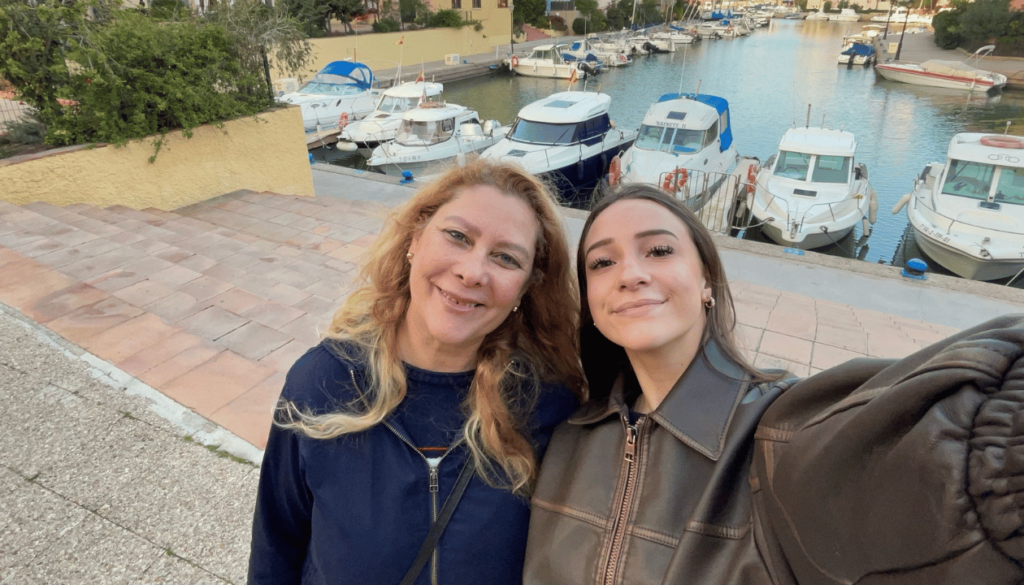
We stopped at a small local shop afterwards, where she picked out some locally made products and practised using everyday phrases. It was also in Port Saplaya where Sophie noticed a crooked tree and, without hesitation, climbed it! We laughed, took photos, and she told the story in Spanish later during dinner.

It was the kind of moment that brings real learning and real joy together.
Arts, Nature, and Shopping at the City of Arts and Sciences
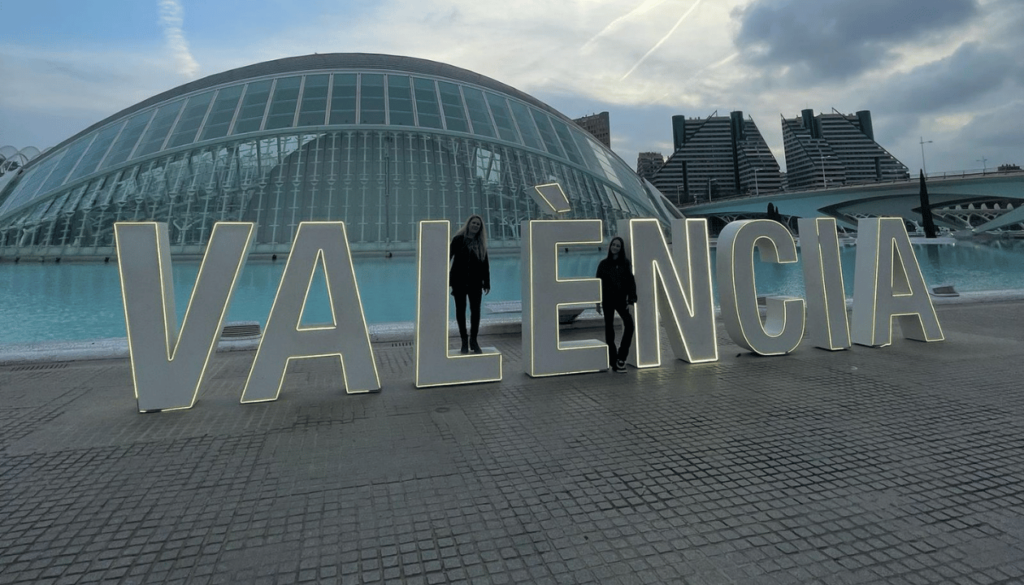
Later in the week, we explored Valencia’s famous City of Arts and Sciences. Sophie was amazed by the bold shapes and bright light of the buildings, especially L’Ágora, where we visited the Art and Nature exhibit. She read signs, asked about the artists, and we spoke entirely in Spanish as we moved through the displays. Her focus and curiosity truly showed here.
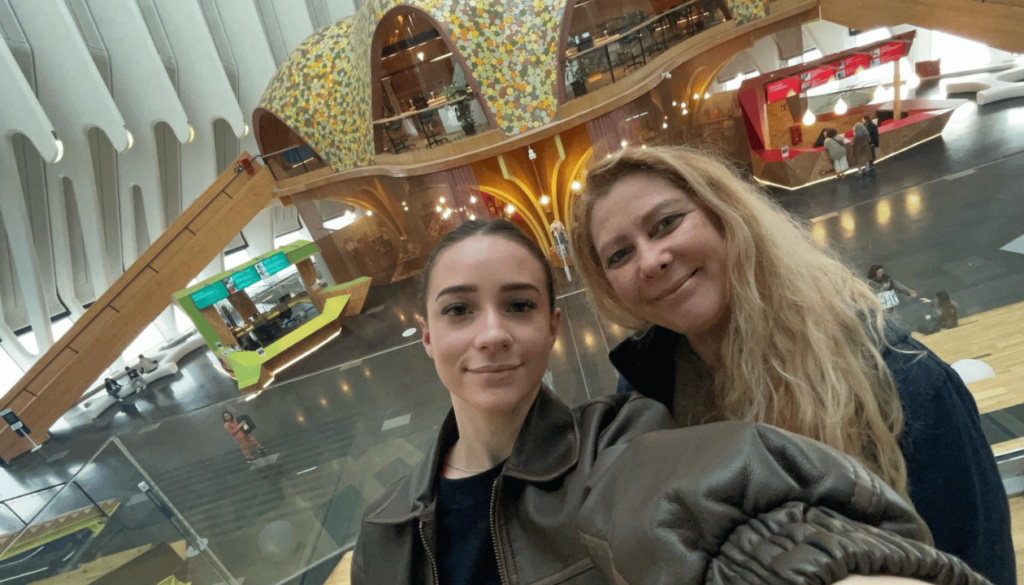
After the museum, we headed to El Corte Inglés. It’s more than just a department store—it’s a place full of everyday language opportunities. From asking for directions to discussing prices, Sophie made full use of her surroundings to practise her communication skills.

Tranquility and Birdsongs at La Albufera Natural Park
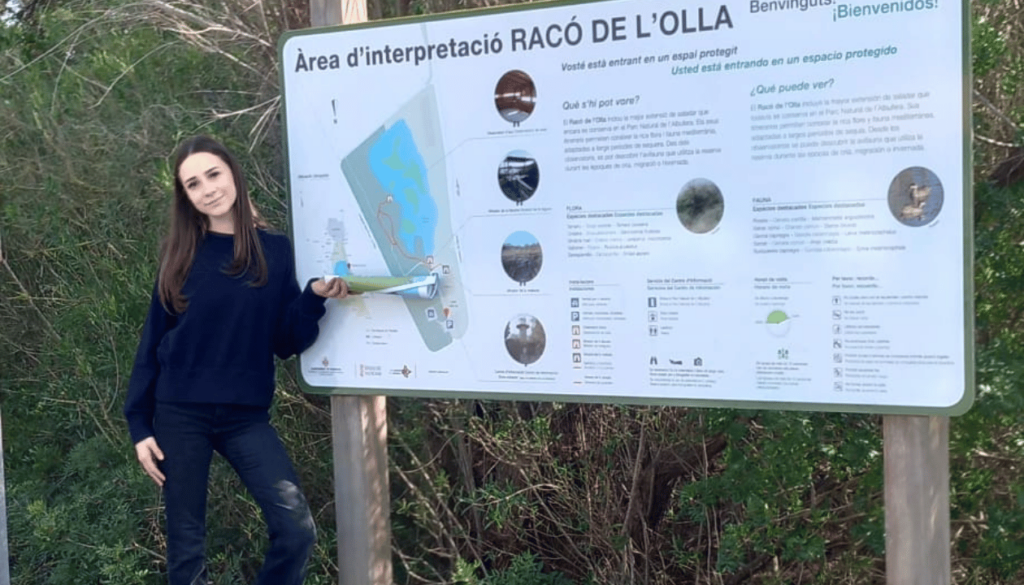
Our day at La Albufera was a quiet highlight. We took a traditional boat ride across the lake, listening to the birds and the wind moving through the reeds. The rhythm of the water helped slow things down, and it became a perfect moment to work on sentence-building.
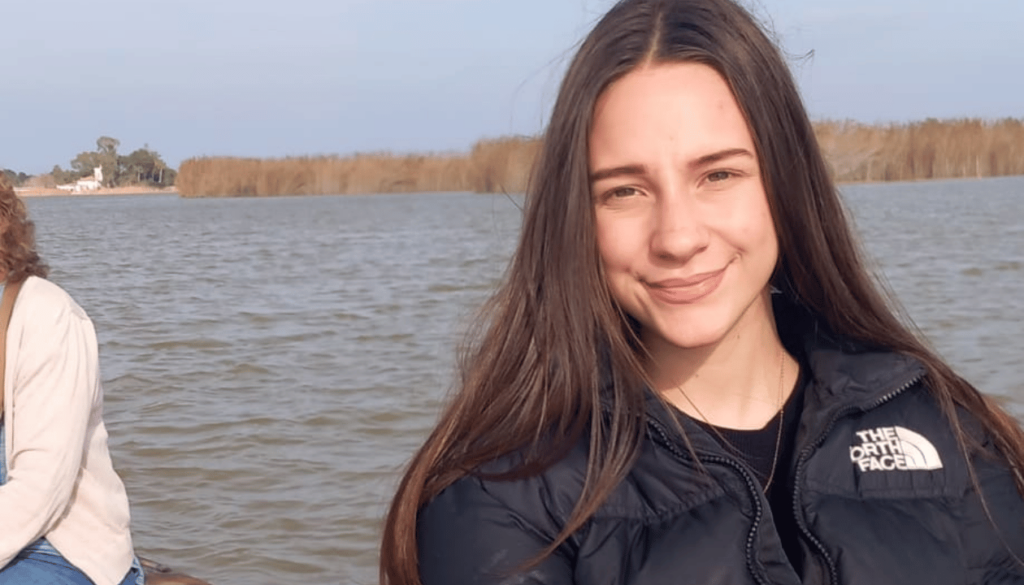
Sophie used descriptive language to talk about what she saw and how she felt. She asked questions about the environment and the area’s history, and I helped her use this setting to apply the pronunciation and vocabulary we had practised earlier in the week.
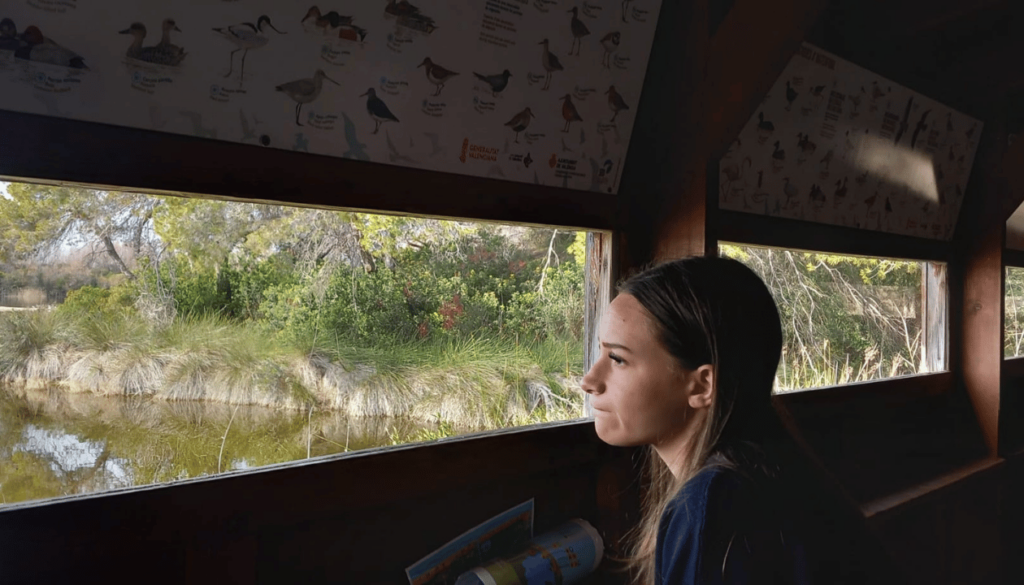
History and Churros in Valencia’s Old Town
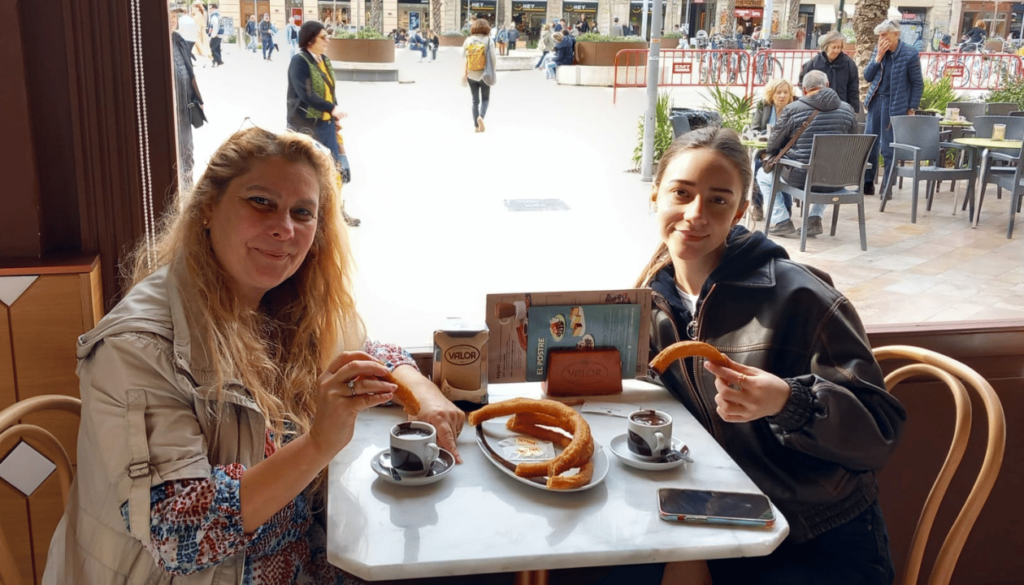
We spent a full afternoon in the historic heart of Valencia. From the Cathedral to Plaza de la Reina, Sophie took it all in with interest and maturity. She especially enjoyed the visit to the Museum of l’Almoina, where we explored Roman ruins together and read museum signs in Spanish.
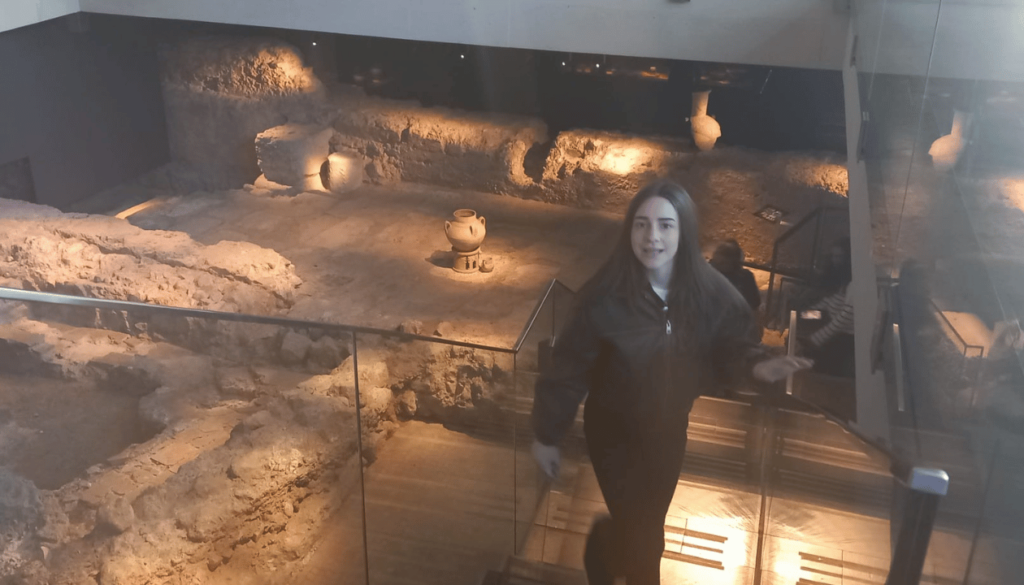
We also visited the Lonja de la Seda, where she learned new words related to trade and tradition. And of course, no Old Town visit is complete without churros! We went to Valor, the city’s beloved chocolate shop, and practised casual conversation as we ordered and relaxed.
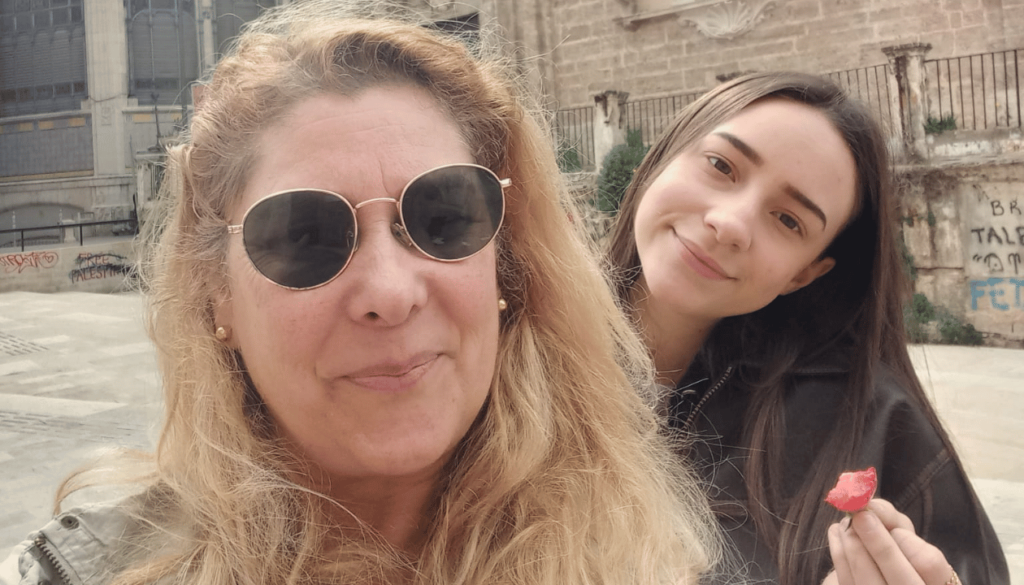
This outing gave her the chance to combine history, food, and friendly conversation in one meaningful experience.
Family, Friends, and Paella in Gilet
On Sophie’s final day, we welcomed her father and brother to Gilet. Together with my family and close friends, we shared a traditional Spanish lunch. My husband made paella outdoors, and we all enjoyed tapas, laughter, and shared stories.
Sophie introduced her family in Spanish, talked about her week, and even explained how to make her favourite toast, grated tomato with olive oil, fresh mint, and jamón serrano. It was wonderful to watch her speak so comfortably, blending everything she had learned into real, warm conversation.
By the end of the meal, she wasn’t just a student anymore—she was part of our table, and part of our lives.
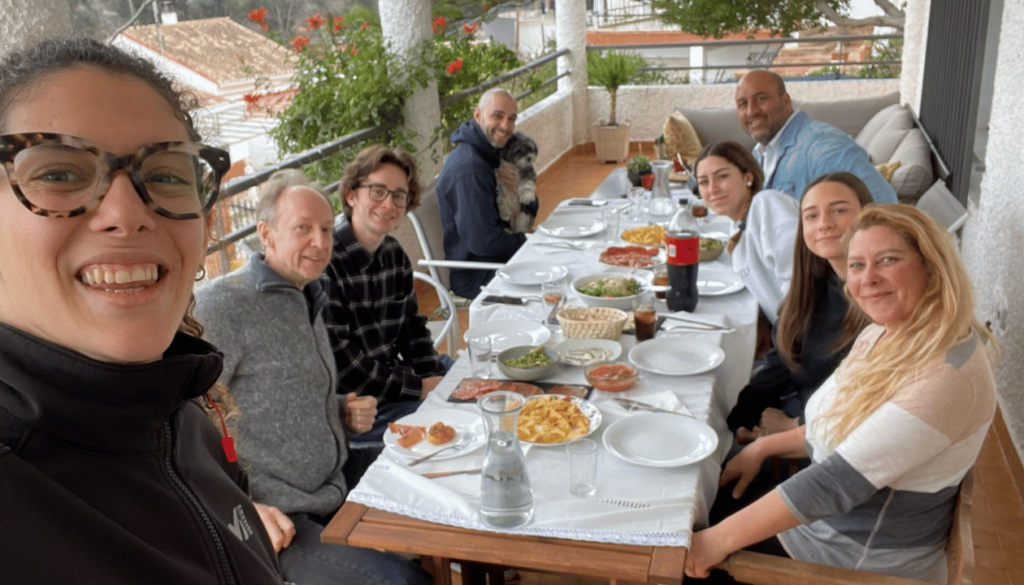
Overcoming Challenges
Learning a foreign language like Spanish for the IGCSE can come with its share of challenges. Many students find Spanish grammar, especially verb tenses and sentence structure, to be tricky at first. Others may struggle with pronunciation, listening to native speakers, or building enough vocabulary to express themselves clearly. It’s normal to feel stuck at times, but with the right approach, these obstacles can be overcome.
One of the best ways to tackle difficulties is through consistent practice and exposure. Engaging in real conversations, whether with tutors, classmates, or native speakers, helps reinforce grammar rules and build confidence. Using tutor-marked assignments and past papers allows students to identify areas for improvement and receive targeted feedback. Online resources, such as interactive exercises and language apps, can make learning more engaging and accessible.
Don’t be afraid to ask for help or try new strategies. Watching Spanish YouTube videos, reading simple books, or even keeping a journal in Spanish can make a big difference. Remember, progress may vary depending on your background and study time, but persistence and a positive attitude will help you master the language and succeed in your exams.
Food, Fun, and Favourite Bites
Mealtimes during Sophie’s stay weren’t just about food—they were part of the learning experience. At home, we shared lunch and dinner together, and she took every opportunity to speak in Spanish. She asked about ingredients, described flavours, and even talked about family recipes, all in her target foreign language.
One of her favourite discoveries was a simple but traditional tapa: toasted bread with tomato, olive oil, mint, and a generous layer of jamón serrano. She loved it so much that she asked how to prepare it herself, and by the end of the week, she could confidently explain the steps in Spanish. Her vocabulary around food and daily habits grew naturally, without needing to look at course materials.
Meals with my family helped Sophie practise specific topics related to everyday life. She listened closely, asked for clarification when needed, and even picked up common expressions from my children and neighbours. These small interactions gave her a stronger sense of rhythm and improved her instinct with the language skills that can’t always come from tutor support or online resources alone.
It was during these relaxed moments at the table, laughing with my husband, chatting with friends, that Sophie’s Spanish course came to life in the most human way possible.
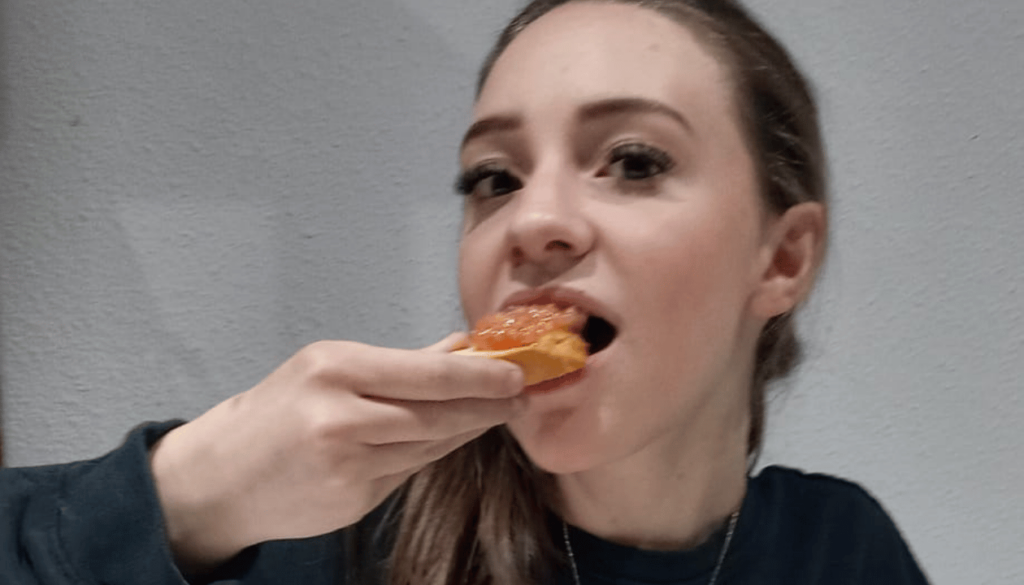
A Week of Learning, Laughter, and Language
Looking back, what made Sophie’s week so special wasn’t just her progress—it was how fully she embraced the experience.
She joined every lesson with focus, brought energy to each cultural visit, and connected with everyone around her. Whether practising Spanish grammar or sharing churros, she made the most of every moment to improve her communication skills.
More than anything, I admired her attitude. She arrived with a goal—to prepare for her IGCSE Spanish exam—but left with something deeper: confidence, fluency, and a genuine bond with the people and the language around her. Predicted grades from her IGCSE Spanish exam can be requested for college applications, providing valuable support in the admissions process. Success in IGCSE Spanish can also open doors to universities that recognize international qualifications, offering further opportunities for academic progression.
With the help of tailored lessons, real-life practice, and a touch of Spanish sunshine, Sophie didn’t just follow a study plan—she lived it.
Helpful Travel Tips for Future SHIP Students

What do I need to enter Spain from the UK?
If you’re travelling from the UK to Spain for your SHIP experience, you’ll need a valid passport that remains valid for at least three months after your return. Thanks to Spain being part of the Schengen area, British citizens can stay in a Spanish-speaking country for up to 90 days without a visa.
I always recommend that students travel with travel insurance, especially if they are studying a foreign language or attending a specialised course like this. It adds peace of mind in case of unexpected health issues or changes in plans.
Do’s and Don’ts in Spain
Spanish culture is warm, open, and full of life—but a little guidance helps you feel at home faster. Always greet others with a polite “¡Hola!”, and use “por favor” and “gracias” generously. Respect local customs, especially during meals or quiet siesta hours in smaller towns.
Don’t assume everyone speaks English. Even basic Spanish will take you far, especially in places where you practise for your oral exam or use vocabulary tied to your tutor-marked assignments. Making an effort to speak the language really builds connection and confidence.
Staying Safe in Valencia
Valencia is a welcoming city, and safety rarely becomes an issue. That said, in busy areas like the Central Market or train stations, keep an eye on your belongings. The local police are helpful, and many speak English if needed.
I also suggest keeping a working mobile phone with a local SIM and a small notebook where you’ve written emergency contacts, your family’s number, and even your exam board details in case your trip is connected to your IGCSE Spanish exam preparation.
And lastly, in summer, drink plenty of water, wear sunscreen, and enjoy every part of this journey. It’s not just a visit, it’s an experience that supports your future plans and your journey through education.
Additional Resources
A wealth of resources is available to support students preparing for the Spanish IGCSE. Online platforms offer interactive exercises, grammar explanations, and vocabulary lists tailored to the exam syllabus. YouTube videos featuring native speakers, exam tips, and listening practice can help improve both comprehension and pronunciation. Many students find that working through past papers and tutor-marked assignments is one of the most effective ways to prepare for the exam format and build confidence.
For those seeking extra support, Spanish private tutors or Spanish online courses can provide personalised guidance and answer specific questions. Language learning apps, flashcards, and podcasts are also excellent tools for practising on the go. Comparing Spanish with other languages you may be studying, such as French, can deepen your understanding of grammar and communication skills.
Finally, don’t overlook the value of real-life practice—whether it’s speaking with friends, joining a language club, or travelling to a Spanish-speaking country. Combining these resources with a clear study plan and regular feedback will help you achieve your goals and enjoy the journey to mastering Spanish at the IGCSE level.

